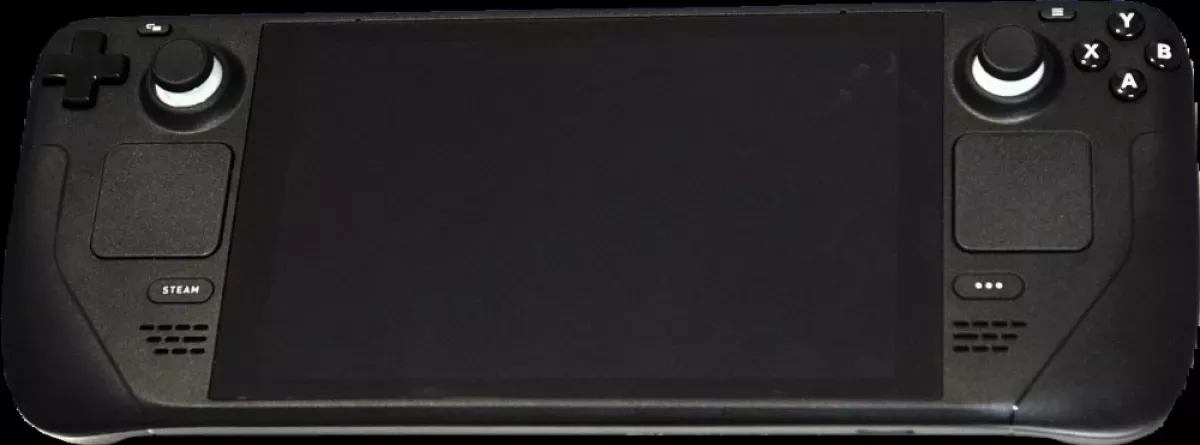The Steam Deck, a handheld gaming computer by Valve, allows users to play their Steam library on the go. Stemming from lessons learned from the Steam Machine and Steam Controller initiatives, the Steam Deck features a custom AMD APU and runs on SteamOS, a Linux-based OS. This device signifies Valve's move towards developing its own hardware, addressing previous difficulties with relying on OEMs for Steam Machines and the hurdle of native Linux game support.
2015: Introduction of Steam Machine
In 2015, Valve introduced the Steam Machine series of gaming computers using Linux-based SteamOS, which influenced the conception of the Steam Deck.
2015: Release of Steam Controller
In 2015, Valve released the Steam Controller which included a small LCD screen which could stream game content from a computer running Steam to a different monitor, inspiring an early concept for the Steam Deck.
April 2018: Valve Quietly Pulled Back on Steam Machine
In April 2018, Valve quietly pulled back on the Steam Machine, a series of gaming computers using Linux-based SteamOS, though they affirmed commitment to an open-hardware platform.
May 2021: Rumors of Portable Gaming Unit
In May 2021, rumors emerged that Valve was working on a portable gaming unit, fueled by updates in the Steam code pointing to a "SteamPal" device and comments from Gabe Newell about developing games for consoles.
June 2021: Steam Deck Pre-Orders Opened
In June 2021, pre-orders for the Steam Deck opened a day after its announcement and were limited to Steam accounts opened before June 2021. The Steam storefront briefly crashed due to high demand.
July 15, 2021: Steam Deck Reveal
On July 15, 2021, Valve revealed the Steam Deck with three different models based on internal storage. Gabe Newell emphasized the focus on performance and an aggressive pricing strategy, considering the mobile market as its competitor.
September 2021: Easy Anti-Cheat Availability
In September 2021, Epic Games' Easy Anti-Cheat was made available for macOS and Linux systems, with Epic stating developers could easily transition for the Proton layer. Valve worked with Epic over the end of 2021 to make the transition of Easy Anti-Cheat to Proton simple for developers.
September 2021: Steam Deck Development Kits Shipped to Developers
In September 2021, Valve began shipping Steam Deck development kits to developers. Valve partnered with Komodo for local production, localization, and distribution support in Asian regions.
October 2021: Steam Deck Game Compatibility Review Process Introduced
In October 2021, Valve introduced a process to review games on Steam for Steam Deck compatibility. Games meeting minimum performance specifications are marked as "Verified", those requiring user adjustments are "Playable", and incompatible games are "Unsupported". Ratings are subject to change with software improvements and developer updates.
November 2021: Steam Deck Shipments Delayed
In November 2021, Valve informed pre-purchasers that due to the global chip shortage, the Steam Deck's shipment would be delayed from December to February 2022, maintaining the original order of delivery.
January 2022: Introduction of Dynamic Cloud Sync
In January 2022, Valve introduced Dynamic Cloud Sync, enhancing Steam's cloud saving by allowing synchronization while a game is running. This feature is designed to make the Steam Deck more user-friendly.
February 2022: Steam Deck Shipments Delayed to Q2/Q3 2022
In February 2022, due to the Steam Deck's popularity, some pre-order purchasers were informed that later shipments of the 64 GB model and 256 GB NVMe models would be in Q2 2022 and the 512 GB NVMe model by Q3 2022.
February 2022: Steam Deck Release
In February 2022, the Steam Deck was released and garnered attention for its versatility. It supports native Linux games and Windows games via Proton, a compatibility layer. The Steam Deck also features a desktop mode and allows the installation of third-party Linux applications.
February 2022: Original Steam Deck Launched
In February 2022, the original Steam Deck was launched with a custom AMD APU based on Zen 2 and RDNA 2 architectures, named Aerith. The CPU and GPU have variable timing frequencies, with performance comparable to Ryzen 3000 desktop processors and Radeon RX 6000 series.
February 25, 2022: Steam Deck Released in North America and Europe
On February 25, 2022, the Steam Deck was released in North America and European regions, with prices varying across Europe. Valve released Windows drivers and AMD drivers but does not provide support for them.
March 1, 2022: Aperture Desk Job Released for Free
On March 1, 2022, Valve released Aperture Desk Job, a spinoff game in the Portal series, for free to all Windows and Linux/SteamOS users. The game is a technology demonstration for the Steam Deck.
June 2022: Valve Doubled Steam Deck Shipping Numbers
In June 2022, Valve announced they were able to double the number of Steam Decks shipping out each week, helping to meet the initial reservations.
August 2022: Valve's Steam Deck Production Outpaces Expectations
In August 2022, Valve's Steam Deck production was outpacing expectations, allowing them to send out Steam Decks to consumers earlier than anticipated.
October 6, 2022: Release of Dock Unit
On October 6, 2022, a dock unit was released for the Steam Deck, allowing connections to external power, monitors (via HDMI or DisplayPort), Ethernet, and USB devices. SteamOS update 3.5.5 also added support for variable refresh rate monitors.

October 2022: Steam Deck Available Without Reservation
By October 2022, Valve had fulfilled all Steam Deck reservations, opening the device for purchase without reservation, though they may return to a reservation system if demand becomes too high.
December 2022: Valve Pursuing Improvements on Steam Deck
As of December 2022, Valve was working on improvements for the Steam Deck, including per-game power profiles and performance enhancements, while also considering a second-generation Steam Deck and a new Steam Controller 2.
December 2022: Steam Deck Officially Released in Asia
In December 2022, the Steam Deck was officially released for sale in Asia.
2022: Steam Deck Sold 1.62 Million Units in 2022
In 2022, the research firm Omdia reported that the Steam Deck sold 1.62 million units. It was one of the most popular purchases on the Steam storefront throughout 2022 and most of 2023.
February 2023: Steam's Big Picture Mode Replaced
In February 2023, Valve replaced the previous Big Picture mode in Steam with one based on the Steam Deck user interface, maintaining consistency with the desktop version and adding portable system indicators.
February 2023: Steam Deck Allows Downloading Games From Local Network Steam Installation
In February 2023, the ability to download games onto the Steam Deck from a local network Steam installation was added. The Steam Deck also allows installation of third-party storefronts and the use of Microsoft Edge for Xbox Cloud Gaming.
November 2023: Announcement of OLED Models
In November 2023, Valve announced two new Steam Deck models with OLED screens, extended battery capacity, and improved cooling. Valve also mentioned they are working on a Steam Deck 2 but it will likely not be ready for two to three years.
November 2023: Valve Announces 'Multiple Millions' of Steam Deck Units Sold
In November 2023, Valve stated that they had sold "multiple millions" of the Steam Deck units.
November 2023: Introduction of OLED Screen Models
In November 2023, new Steam Deck models were introduced featuring OLED screens, representing a revision of the original design.
November 16, 2023: Release of New Steam Deck Models
On November 16, 2023, two new Steam Deck models with 512 GB and 1 TB of storage were released, replacing the previous top-of-the-line LCD variant. The 64 GB and 512 GB original units were discontinued, and the new models include an OLED display, improved Wi-Fi and Bluetooth support, and a revised APU named Sephiroth.
2023: Launch of Similar Handheld Gaming Computers
In 2023, the Steam Deck is credited with triggering a wave of similar handheld gaming computers, including the Asus ROG Ally and Lenovo Legion Go.
October 2024: Steam Deck Officially Available in Australia
In October 2024, Valve announced that the Steam Deck would be officially available to the Australian market from November, two years after its initial release.
2024: MSI Claw A1M Launched in 2024
In 2024, the MSI Claw A1M was launched in the market, among other similar handheld gaming computers.

February 2025: IDC estimates Steam Deck Sales by February 2025
Market research firm International Data Corporation estimated that between 3.7 and 4 million Steam Decks had been sold by the third anniversary of the device in February 2025.
Mentioned in this timeline

Epic Games founded by Tim Sweeney as Potomac Computer Systems...
Australia officially the Commonwealth of Australia encompasses the Australian mainland...

September is the ninth month of the year in the...

Stocks represent fractional ownership of a corporation granting shareholders a...
Trending

39 minutes ago Travis Kelce and Taylor Swift's relationship update: Hockey, wedding, and keeping things private.

2 hours ago Metallica Announces Sphere Las Vegas Residency: 'Life Burns Faster' Concert Series in 2026

3 hours ago Priyanka Chopra Jonas stars in 'The Bluff,' a gritty pirate action movie.

3 hours ago Lupita Nyong'o Shares Fibroid Struggle, Advocates for Women's Health in New Campaign

5 hours ago Souvenir Shop Manager Reflects on Final Groundhog Day with Punxsutawney Phil

5 hours ago Mike Tirico's Inspiring Olympic Sign-Off: A Look at His Legacy in Sports Broadcasting.
Popular

Jesse Jackson is an American civil rights activist politician and...

Susan Rice is an American diplomat and public official prominent...

Barack Obama the th U S President - was the...

Michael Joseph Jackson the King of Pop was a highly...

XXXTentacion born Jahseh Dwayne Ricardo Onfroy was a controversial yet...

Bernie Sanders is a prominent American politician currently serving as...


